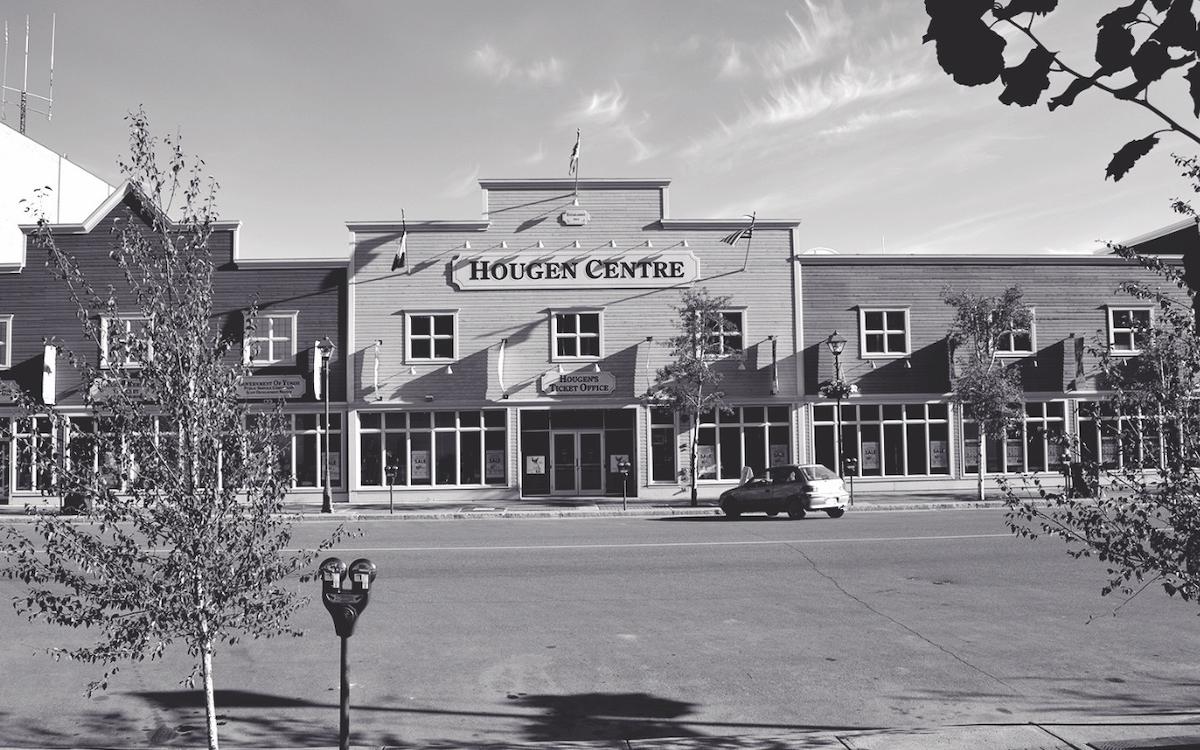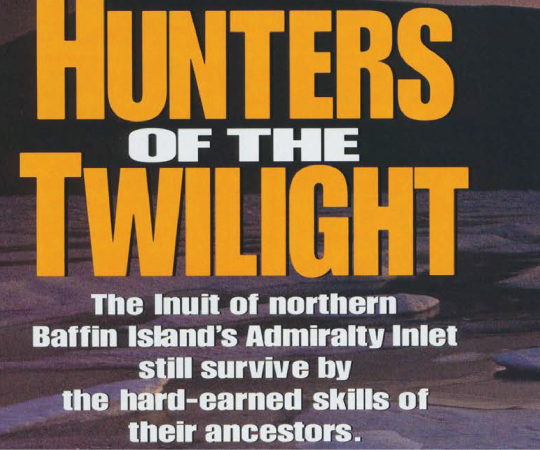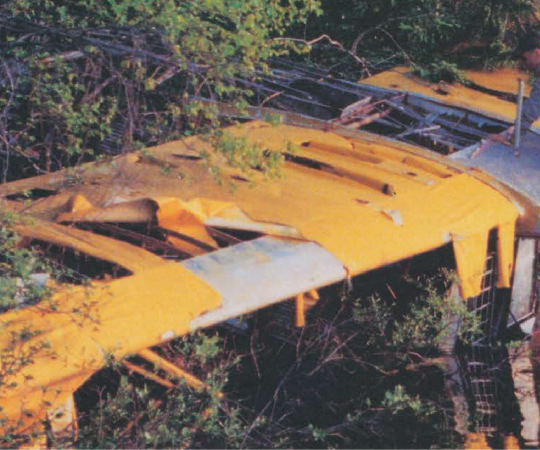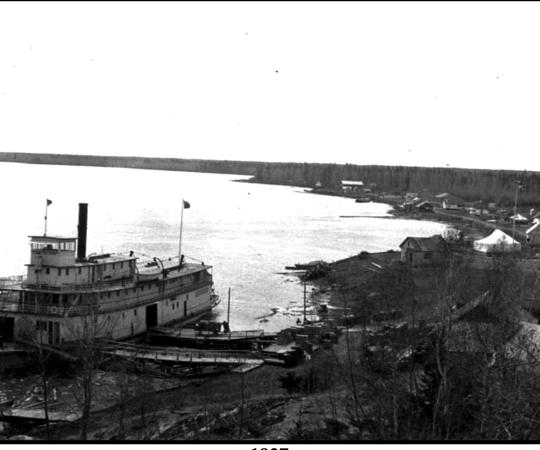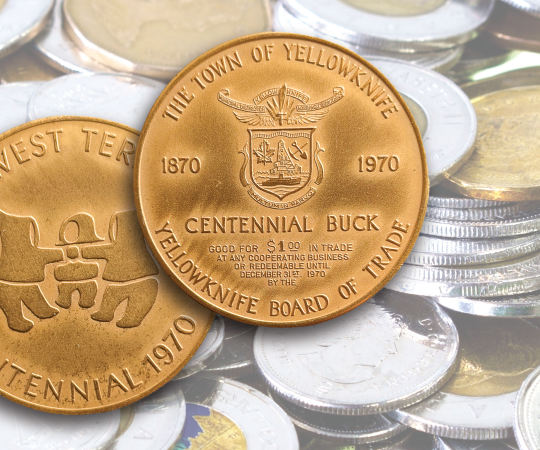The North is shrinking—and Yukon business pioneer and philanthropist Rolf Hougen helped make that happen. After all, he brought in one of the first department stores, and was responsible for turning on one of the original cable channels (albeit to watch a fishbowl in real time). In 1944, the Hougens opened the family’s first store in Whitehorse. Since then, Rolf and his wife Margaret have built a veritable business empire from the Yukon capital. Along the way, his children, their partners, and their children helped manage and expand The Hougen Group of Companies, a network of retail, investment, property development, and communications businesses. Now 90, Rolf Hougen has left behind most of his business interests. But he’s not resting yet. “I have a lot of things left to do, so I want to stick around for a few more years,” he says.

The first store
Berent Hougen first arrived in the Yukon in 1906 as a passenger on the Whitepass railroad. Although the Gold Rush in Dawson City had passed, Berent made his way to the Klondike and found work with dredging companies. Six years later, he returned to his native Norway but the North brought him back to Whitehorse in 1944, this time with his whole family—including Rolf, the youngest of his seven children. Berent opened a small store on Wood Street selling Rawleigh’s home remedies, extracts, and other household products. At 14, Rolf worked in the store before
and after school. By the time he was 19, Rolf had taken over his dad’s business, expanding into a larger building on Main Street. “We started very, very small,” he says. “We went from a hole in the wall business to a bigger hole in the wall in what is now the Edgewater Hotel.”
Business pioneer
His ambition quickly outgrew that location. Next, he opened a department store selling everything from clothes to photography equipment among many other ventures. “We kept buying businesses as they became available to a point in 1958 when we had to build our own building,” he says. Over the next years, he crisscrossed Canada, leaving a trail of business deals in his wake. ˚
For five years running, I was top five in flyers with Canadian Pacific Airlines—number one in some years—because I was flying so much,” Hougen says. One particular week in 1969 saw him open a retail store in Faro, a Ford dealership in Whitehorse, and launch the Klondike Broadcasting Company and the Whitehorse radio station CKRW.
Across Canada, the arrival of national department and big box stores were ruining local retailers but Hougen was prepared for the disruption thanks to the hubris of a friend in Newfoundland who thought his local department store was so well known that it would survive the competition. “They went bankrupt so I saw a lesson in that. When the big stores started arriving in Whitehorse, I started planning to downsize the department store and closing departments that weren’t performing well and selling others. The businesses we kept were the ones where stores like Wal-Mart couldn’t compete. Higher-end products. Similar products, but lower quality. We focused on specialty stores and that worked out well.”

Broadcast pioneer
From cable and satellite television to radio broadcasting, the Hougens helped bring the world into the homes of Yukoners. In 1955, Rolf and Marg were on their honeymoon when he learned about a man in Ketchikan, Alaska who built a rudimentary one-channel cable network by stringing wires between telephone poles in the small community. He wanted to do the same in Whitehorse, and with a couple of business partners founded WHTV Cable. The one-channel operation ran out of the old Whitehorse Inn. The company flew in reels of news and sports—but also produced local programming, like interviews with residents, a “reality TV” show that was just a camera pointed out a window filming people on Main Street, and a show that played music over a live shot of a goldfish bowl. The company, which eventually offered dozens of channels, was sold to Northwestel in 2007.
For a period, WHTV had someone in Vancouver recording programming off other channels to send up North. The cumbersome process of developing and obtaining programming led to Hougen’s next big venture: satellite TV. His concept involved putting signals on a satellite network and delivering channels to homes or to smaller cable companies that would package the channels and deliver them for a fee. Hougen charged these companies a dollar a month for each channel included in the package.
“I was on the board of the cable television company at the time and I took the concept to them and the chairman basically laughed at me and said it’s a stupid idea that will never work,” Hougen says. As his proposal advanced through the regulatory system, the project grew to $38 million from its initial $25 million budget. “In the end, in order to get the money I had to sell some of my stock. So I went from the biggest shareholder to the smallest between the four of us, to about 10 per cent rather than 40 per cent. In two years we started to make money.”
Hougen eventually sold Canadian Satellite Communications Ltd. to Canadian cable giant Shaw.
Community historian
Now 90, Hougen is dedicating his time to philanthropy and community history. “My objective is to pass on as much history about Whitehorse and the Yukon as I can before I go.”
He’s organizing his large archive of photos—about 40,000 images, including the historical Hamacher collection—and writings on Yukon history. Hougen is a photographer and rarely was without a camera on his many trips around the territory, making for a valuable collection that he has donated to the Yukon Archives. His dedication to history earned him a lifetime achievement award from the Yukon Historical and Museums Association in 2011.
“There’s information in my head that if I’m not around to tell the stories, the stories will be lost,” he says. “I’ve told the family not to throw anything in the garbage when I’m gone. Let it go to the archives and they can decide to throw it in the garbage.”
As longtime art collectors, the Hougens are supporters of the local arts scene. They donated the basement space of The Hougen Centre to the Yukon Arts Society to open a gallery space for local artists. Arts Underground is a 4,500 square foot gallery, workshop and gift shop. More recently, the Hougens have donated bronze busts of Yukon artists—such as Martha Black and Edith Josie—to the city for public display.

The deal not made
His biggest regret in business is not buying the Whitepass Railroad when he had the chance. It’s the deal that got away. The rail line used to haul ore from the Faro mine to Skagway, but when a road was built the Whitepass Railroad owners decided to sell.
Hougen put together a business proposal with a group of investors. The company asked for $10 million, but the investor group only had $7 million. When the Yukon government denied a request for funding to make up the difference, Hougen turned his research over to the railroad owners, who then decided to keep it and retool it as a tourist line. “They did everything according to my study and recommendations,” says Hougen, adding that they even followed his idea to extend the line to Carcross.
Years later, the railroad eventually sold for $270 million to two of Hougen’s original investment partners. “The mistake I did make was that I should have gone to the two ship owners with deep pockets and carved out a bigger piece for them if they came up with the additional funding. I didn’t make the offer and had I done so we would have kept the ownership in the west.”
The Future
The Hougen children—Kelly, Karen, Erik, Greta and Maureen—have long been involved in the family businesses, often starting as after-school employees like their dad did. Now, they own many of the enterprises their parents founded.
But Rolf’s always available to give advice. “We wanted the family to be our successors in business and I’m sure in turn they want their children to be their successors.”
Even at his busiest, Hougen made time for the kids. “Family always came first. We always made time for family from the day they were born. No matter how busy we were, there was always family time. I would get the kids up at four in the morning to go duck hunting. They remember fight night where we’d get on the floor and wrestle around.” Their frequent family trips grew in size as their children had children. Pictures from trips to China, Norway, and France are crammed to the frames with people.
“I feel like I’ve spent 25 years living on airplanes. It was tough to be away but Marg looked after the kids very, very well. And it was great when she could travel with me. Our children passed on how they were brought up.”

